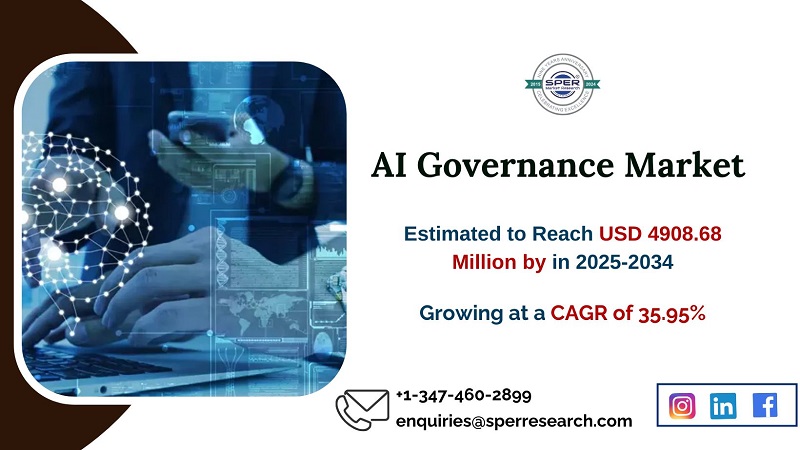AI governance is a set of policies, concepts, and practices aimed to assure the ethical, transparent, and responsible development, deployment, and usage of artificial intelligence technologies. It includes a wide range of factors, such as data privacy, algorithmic fairness, accountability, and adherence to legal and regulatory norms. Effective AI governance attempts to reduce risks such as bias, discrimination, and exploitation of AI while also increasing trust and societal benefits. Organizations that apply AI governance create guidelines for decision-making, monitoring, and auditing AI systems to guarantee they comply with ethical standards and organizational objectives. As AI evolves and permeates multiple industries, strong governance is essential for balancing innovation with responsibility and ensuring AI systems are used to benefit individuals, businesses, and society.
According to SPER market research, ‘AI Governance Market Size- By Component, By Deployment Mode, By Enterprise Size, By Industry Vertical – Regional Outlook, Competitive Strategies and Segment Forecast to 2034’ state that the Global AI Governance Market is predicted to reach 4908.68 million by 2034 with a CAGR of 35.95%.
Drivers: The key causes are the growing deployment of AI technology across businesses, as well as an increased understanding of AI’s ethical, legal, and societal ramifications. Organizations are recognizing the need for strong frameworks to assure accountability, transparency, and fairness in AI systems, especially as concerns about bias, discrimination, and data privacy grow. Regulatory obligations and government initiatives aimed at encouraging ethical AI use are driving firms to invest in governance systems. Furthermore, the increasing volume of data and complexity of AI algorithms emphasize the significance of monitoring and auditing AI systems in order to preserve compliance and develop public trust.
Restraints: A significant obstacle is the lack of defined standards and globally acknowledged frameworks, which make it difficult for firms to develop consistent governance processes. The rapid rate of AI progress frequently exceeds regulators’ ability to formulate complete policies, resulting in gaps in supervision. Furthermore, mitigating prejudice and guaranteeing fairness in AI systems remain difficult challenges due to the opaque nature of some machine learning algorithms, also known as “black box” models. Limited awareness and competence in AI governance, particularly among small and medium-sized businesses, further impedes implementation. Furthermore, regional differences in cultural, economic, and legal priorities hamper global convergence on ethical AI practices.
Request For Free Sample Report @ https://www.sperresearch.com/report-store/aI-governance-market.aspx?sample=1
North America leads the global AI governance market, owing to robust regulatory frameworks, significant levels of AI use across industries, the presence of big tech companies, and proactive government programs that encourage responsible AI development. Some significant market players are Atos SE, Dataiku, FICO Inc, Google LLC (Alphabet Inc), H2O.ai Inc, Informatica Inc, International Business Machines Corporation, and others.
AI Governance Market Segmentation:
By Component: Based on the Component, Global AI Governance Market is segmented as; Solutions, Services.
By Deployment Mode: Based on the Deployment Mode, Global AI Governance Market is segmented as; On-Premises, Cloud-Based.
By Enterprise Size: Based on the Enterprise Size, Global AI Governance Market is segmented as; Large Enterprises, Small and Medium – Sized Enterprises (SMEs).
By Industry Vertical: Based on the Industry Vertical, Global AI Governance Market is segmented as; BFSI, Government and Defense, Healthcare and Life Sciences, Media and Entertainment, Retail, IT and Telecom, Automotive.
By Region: This research also includes data for North America, Latin America, Asia-Pacific, Europe, Middle East & Africa.
For More Information, refer to below link: –
Related Reports:
Contact Us:
Sara Lopes, Business Consultant — USA
+1–347–460–2899
